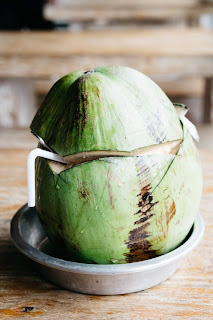Coconut Water and Its Benefits
Coconut water is the liquid inside coconuts.
Nutritional value:
Coconut water provides 19 calories in a 100 milliliters
amount, coconut water is 95% water, 4% carbohydrates, protein and total fat
content under 1% each. Coconut water contains vitamins and dietary minerals in
small amounts.
As 'Everything in excess is opposed to nature's
Excessive consumption of coconut water is an excess of
potassium in the blood, inducing loss of consciousness, acute kidney failure,
and eventually death.
Here are health benefits of coconut water.
1. Have Antioxidant Properties
Free radicals are unstable molecules produced in your cells
during digestion. Production of free radicals increases in response to stress
or injury.
At the point when there are excesses of free radicals, your
body enters a condition of oxidative stress, which can harm your cells and increase
disease risk.
Research on animals has shown that coconut water contains
antioxidants which adjust free radicals, so they no longer cause harm.
Up until now, no studies have investigated this antioxidant
activity in humans.
Coconuts grow on palm trees scientifically known as Cocos
nucifera. Coconut water is the juice found in the center of coconut.
As the coconut matures, few amounts of juice remain in
liquid form while the rest ages into white flesh known as coconut meat.
Coconut water contains 94% water and very less fat.
One should not be confused with coconut milk, which is made
by adding water to grated coconut meat. Coconut milk contains about 50% water
and is very high in coconut fat as comparison to coconut water.
One cup (240 ml) contains 46 calories, just as:
Carbs: 9 grams
Fiber: 3 grams
Protein: 2 grams
Vitamin C: 10% of the RDI
Magnesium: 15% of the RDI
Manganese: 17% of the RDI
Potassium: 17% of the RDI
Sodium: 11% of the RDI
Calcium: 6% of the RDI
Drinking enough fluids is important to prevent kidney stone.
One study suggests that coconut water may be even better
than the plain water.
Kidney stones form when your urine contains more
crystal-forming substances for example, oxalate, calcium and uric acid than the
liquid in your urine can dilute. Simultaneously, your urine may lack substances
that prevent crystals from sticking together, making a perfect situation for
kidney stones to form.
Presence of potassium in
coconut water helps in dissolving kidney stones, which plays a vital role in
urine alkalizing and preventing kidney stones.
Researchers believe that coconut water helps in reducing
free radical production in response to high oxalate levels in urine.
Keep in mind that this is the study examining coconut
water's effects on kidney stones. More research is required here.
Coconut water may be great for lowering and controlling
blood pressure.
Coconut water improved systolic blood pressure (the higher
number of a blood pressure reading) in 71% of participants.
Moreover, coconut water contains around 600 mg of potassium
in 8 ounces (240ml). Potassium helps in lowering blood pressure in
people with high or normal blood pressure.
Likewise, one animal study found that coconut water has
hostile to thrombotic activity, which means it might avoid the formation of
blood clots.
Coconut water might be the ideal drink for reestablishing
hydration and renewing electrolytes lost during exercise.
Electrolytes are those minerals which play several
important roles in our body, that includes maintaining proper fluid balance.
They include potassium, magnesium, sodium and calcium.
Studies found that coconut water is better than water and
equal to high-electrolyte sports beverages in restoring hydration
after exercise.
Coconut water causes less nausea and stomach discomfort.
However, another study found that comparing
high-electrolyte beverages with coconut water, found that coconut water tended
to cause the most bloating and stomach upset.




Comments
Post a Comment